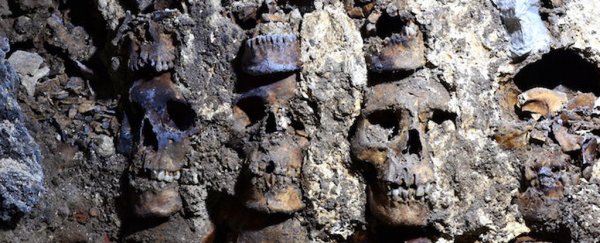Mexican archaeologists said Friday they had found remains of 119 more people, including women and several children, in a centuries-old Aztec "tower of skulls" in the heart of the capital.
The new discovery was announced after an eastern section of the Huei Tzompantli was uncovered along with the outer facade, five years after the northeastern side was found.
Archaeologists believe that many of the skulls belonged to captured enemy warriors and that the tower was intended as a warning to rivals of the Aztec empire, which was overthrown by Spanish conquistadors in 1521.
Some of the remains could be of people who were killed in ritual sacrifices to appease the gods, according to experts quoted in a statement released by the National Anthropology and History Institute.
"Although we cannot determine how many of these individuals were warriors, perhaps some were captives set aside for sacrificial ceremonies," archaeologist Barrera Rodriguez said.
The tower, 4.7 meters (15.4 feet) in diameter, is thought to have been built around the end of the 15th century.
#PrensaINAH 🗞️
— INAH (@INAHmx) December 11, 2020
Arqueólogos localizan el costado este y la fachada externa de la torre de cráneos del Huei Tzompantli de Tenochtitlan; en la sección este de la torre se han visualizado, superficialmente, 119 cráneos humanos que se suman a los 484 identificados anteriormente. pic.twitter.com/B6FixWUQlO
It is located in the area of the Templo Mayor, one of the main temples of the Aztec capital Tenochtitlan in the historic district of modern-day Mexico City.
In total more than 600 skulls have now been found at the site, which Mexican authorities have described as one of the country's most important archaeological discoveries in years.
"At every step, the Templo Mayor continues to surprise us," Culture Minister Alejandra Frausto said in a statement.
"The Huei Tzompantli is, without a doubt, one of the most impressive archaeological finds in our country in recent years."
The statement noted that in Mesoamerica human sacrifice was seen as a way of ensuring the continued existence of the universe.
For that reason, experts consider the tower to be "a building of life rather than death," it said.
